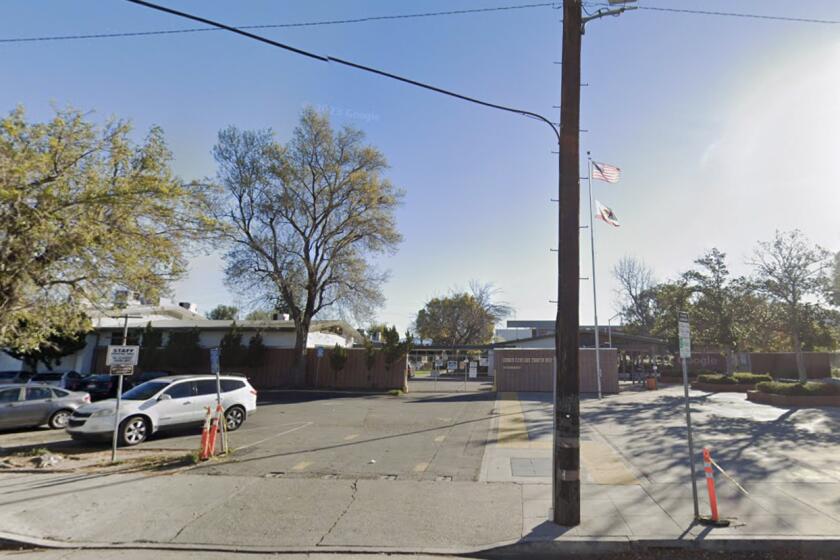When your seatmates are loud and louder
I wish the noise patrol that got the book club banished from the Napa Valley Wine Train had come along on my vacation instead.
The dust-up on the train drew international attention: 11 women from Sistahs on the Reading Edge — all but one of them black — were asked to leave halfway through their wine-sipping trip because at least one other passenger thought they were laughing too loud, being too boisterous.
I read The Times’ story about the incident as I was heading off last week with my fingers in my ears, trying to muffle the noise from passengers seated around me:
Whining children. A man listening to head-banging music too loud for his earphones to contain. A woman jabbering about a co-worker’s pregnancy in a voice that sounded like nails on a chalk board.
And that was just on the Flyaway bus to LAX.
Things got worse on the airplane, where I wound up across the aisle from a man in a “Straight Outta Compton” shirt who loudly entertained his seatmates with tales punctuated every few words by a cackling laugh.
I thought my head would explode. But others didn’t seem to mind, and I didn’t dare complain. I wondered whether the problem might not be his voice, but my attitude.
Were the folks I found annoying really too loud, or was I just being a grump?
::
The Napa Valley incident made headlines because of its racial dimensions.
Would those middle-aged, middle-class book lovers have been paraded through the train and handed off to police if they had been laughing-while-white?
I think not.
Their ejection touched a chord in a nation where segregated train compartments were one of the most enduring emblems of institutionalized bigotry. For more than 100 years, blacks in much of the country could only travel in Jim Crow cars, with no access to bathrooms or dining facilities.
The book club’s humiliating march to the exit was a stinging reminder of lingering inequality. Some of the women were in tears. Others were enraged.
They had informed agents when they booked the ride that they would be enjoying one another’s company and might be loud onboard. But their plan to celebrate was trumped by others’ intolerance.
“This is not a bar,” one white passenger reportedly huffed as the women were led past her. What about “wine train” didn’t she understand?
It didn’t take long for the Napa Wine Train’s CEO to blame the book ladies, accusing them in a Facebook post of “verbal and physical abuse toward other guests and staff.” He soon deleted that claim and offered this mea culpa: His company, he said, had “failed in every measure of the meaning of good service, respect and hospitality.”
::
That’s not exactly true.
Wine train officials respected the passengers who wanted to sip in peace and quiet — by disrespecting those who chose to live it up.
In this case, the dispute may be resolved with a checkbook. The book club has hired a civil rights lawyer, who is threatening to sue.
But the fundamental issue — how we handle personal conflicts and balance social norms — can’t be so neatly managed.
It’s not easy to know when to complain, when to let things slide and when to rely on someone else to do the dirty work for you.
I can’t help but wonder what would have happened had a passenger on that train walked over to the book club with a smile and polite request: “So glad you ladies are having fun, but can you turn it down a bit so we can enjoy ourselves?”
Instead the women got hard stares, whispered complaints and hostile remarks — and responded in a fashion just as unkind, by posting a photo of the presumed complainant on social media to be reviled and mocked.
We act as if the only thing that matters is whether we’re happy — as if real life were an online world where intrusions can be dispatched by hitting “delete” and surroundings modified with a swipe of the screen.
We police one another to make sure we’re not being inconvenienced or taken advantage of.
At the airport, I surreptitiously checked out others’ boarding passes to assure that no one cut in front of me. My reward for that diligence? The guy with the cackling laugh.
And if that weren’t lesson enough, the last leg of my late-night flight made me consider my picayune concerns in a whole new light.
A big man plopped down in the middle seat next to me. I was annoyed because he hogged both armrests, but I didn’t speak up.
The minute the plane landed, he pulled out his phone. I heard him inquiring about visiting hours for pediatric patients. He was flying from Houston to Los Angeles because his son was in the hospital.
At that moment, I was glad I had resisted the urge to claim the space I felt was rightfully mine. I only wish I had been less self-centered and more unreservedly kind.
Twitter: @SandyBanksLAT
More to Read
Start your day right
Sign up for Essential California for news, features and recommendations from the L.A. Times and beyond in your inbox six days a week.
You may occasionally receive promotional content from the Los Angeles Times.







